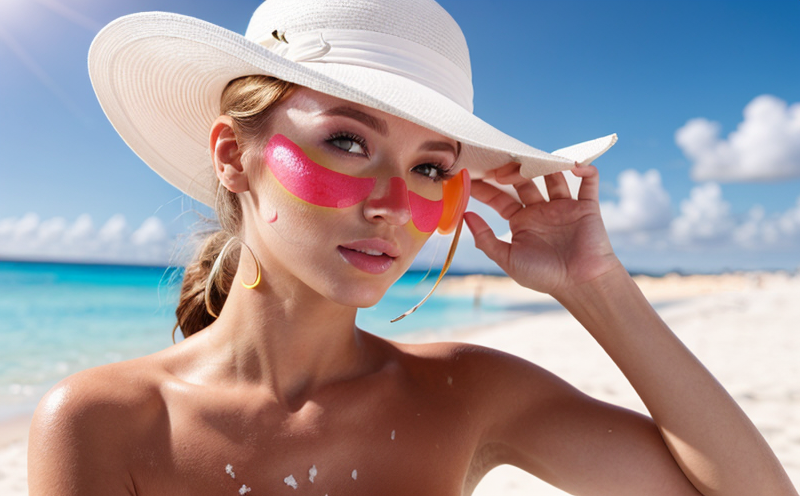Sweat-Resistant Sports Sunscreen Testing
The testing of sweat-resistant sports sunscreens is a critical component in ensuring that products effectively protect users from harmful ultraviolet (UV) radiation, even under extreme conditions like intense physical activity and exposure to heat. This service ensures that the sunscreen not only meets basic SPF requirements but also maintains its efficacy when exposed to the rigors of sport and sweating.
Sweat-resistant testing is particularly important for sunscreens used in sports such as running, cycling, or swimming, where prolonged periods of physical exertion can lead to significant perspiration. The primary goal of this testing is to determine how well a sunscreen retains its protective properties after extended exposure to sweat and water, which can dilute the product's active ingredients.
During testing, samples are exposed to controlled conditions that simulate real-world scenarios encountered by athletes during their activities. This includes not only high temperatures but also humidity levels common in sports environments. The test subjects often undergo rigorous exercise routines designed to mimic actual sporting activities, ensuring accurate assessment of the sunscreen's performance under stress.
The testing process typically involves several key steps: initial application of the sunscreen according to manufacturer guidelines, followed by exposure to conditions that promote sweating and water loss. Specimen preparation is crucial; it ensures that the sunscreen remains adherent to the skin surface despite the challenges posed by sweat and physical activity. Instrumentation plays a vital role here too, allowing for precise measurement of UV protection factor (SPF) before and after testing.
Once the test period concludes, samples are analyzed using advanced spectrophotometric techniques to evaluate their ability to block harmful UVA and UVB rays. Reporting is comprehensive, detailing both quantitative measures such as SPF values and qualitative observations about texture changes or other alterations due to prolonged exposure.
This service supports various stakeholders within the cosmetics industry, including quality managers who need assurance that their products meet regulatory standards; compliance officers responsible for ensuring adherence to international guidelines like those set forth by ISO and ASTM; R&D engineers looking to improve product formulations; and procurement teams seeking reliable suppliers of high-quality sunscreens.
By providing robust evidence supporting the sweat-resistant properties of sports sunscreens, this testing service helps maintain consumer confidence in safe and effective products. It also contributes significantly towards enhancing overall public health by promoting healthier lifestyle choices through proper protection against UV radiation.
Applied Standards
The testing procedures for sweat-resistant sports sunscreens adhere strictly to international standards such as ISO 24678 and ASTM F3159. These standards provide clear guidelines on how to conduct these tests, ensuring consistency across different laboratories worldwide.
| Standard | Description |
|---|---|
| ISO 24678 | Test methods for the determination of water resistance and sweat resistance of sunscreen products. This standard specifies procedures to assess how well a sunscreen retains its effectiveness when exposed to both water and sweat. |
| ASTM F3159 | American Society for Testing Materials' standard for testing the performance of sunscreens under conditions simulating real-world use, including exposure to UV radiation while wearing protective clothing. This helps ensure that the sunscreen can provide adequate protection even during strenuous activities. |
Compliance with these standards ensures that the results obtained from our testing are credible and internationally accepted. It also allows for easier comparison between different products, facilitating informed decision-making by consumers and manufacturers alike.
International Acceptance and Recognition
The rigorous testing of sweat-resistant sports sunscreens is widely recognized both nationally and internationally as an essential step in guaranteeing product quality and safety. Laboratories accredited to perform these tests are trusted by numerous stakeholders, including regulatory bodies, manufacturers, retailers, and consumers.
Regulatory authorities like the U.S. Food and Drug Administration (FDA) and the European Commission's Cosmetics Directive require that sunscreens meet specific standards before they can be marketed. Our laboratory is certified to conduct these tests according to international norms, thereby ensuring compliance with global regulations.
Manufacturers benefit greatly from our testing services by gaining valuable insights into their product performance under real-world conditions. This information enables them to make improvements where necessary and maintain competitive edge in the market.
Retailers can rely on these test results when selecting products for sale, knowing that they have been rigorously evaluated against established criteria. Consumers, too, can feel assured about purchasing sweat-resistant sports sunscreens that have passed stringent quality checks.
The international acceptance of our testing services is further enhanced by recognition from prominent industry associations and organizations worldwide. This broad acceptance fosters trust among all parties involved in the cosmetics sector, contributing to a safer, more reliable supply chain for sunscreen products.





